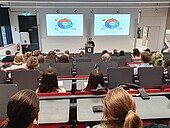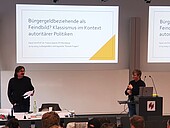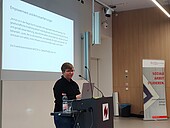Last Thursday evening, March 27, a packed auditorium in the C building marked the start of the second season of the "Social Issues" event series on the HWG campus. In cooperation with Professor Immacolata Amodeo from the Ernst Bloch Center, Professors Peter Rahn and Jörg Reitzig from the Department of Social and Health Care launched the series last winter semester. At the start of the summer semester, the series was continued with a lecture by Francis Seeck, Professor of Social Work with a focus on democracy and human rights education at Nuremberg Institute of Technology. The lecture, in which the audience was involved in a participatory manner by means of mentimeter surveys and marble groups, focused on the analysis of classist devaluations and empirical findings of class-based differentiation characteristics, for example with regard to different access to education. Seeck referred to the results of the International Primary School Reading Survey (IGLU), according to which children from academic households are predicted by their teachers to be recommended for grammar school twice as often as children from working-class families and the latter would also have to achieve a significantly higher level of reading competence to receive such a recommendation. For example, only 20 out of every hundred non-academic children obtain a bachelor's degree - compared to 65 for academics. And when politicians often talk about total refuseniks in their statements on recipients of citizen's allowance, they overlook the fact that this only applies to around 16,000 recipients of citizen's allowance, while 1.8 million recipients are children and young people. A further 2 million are not available to the labor market for other activities because they are single parents, care for relatives or cannot make a sufficient living from their gainful employment as so-called 'top-ups'. The minimum wage has risen by around 35% in recent years, significantly more than the citizen's income, which has risen by around 26%.
The subsequent discussion, which was moderated by Peter Rahn, was extremely lively. This was probably not least due to the thought experiment that the guest from Nuremberg invited the participants to perform at the end of the presentation. If, the audience was asked to consider, a miracle happened overnight and we suddenly lived in a socially just society, how would we know the next morning that the miracle had happened? While some argued that there would then be no more food banks or homeless people, others argued that some of the social work institutions in which they currently work would probably no longer be necessary. The diversity of the responses reflected the diversity of social problems and poverty situations in real society. Finally, when asked whether Bourdieu's concept of class, which was referred to in the lecture, was more important than Marx's concept of class, Francis Seeck stated that he did not see any hierarchy here. However, a substantive critique of classism theory requires differentiated data, as can be found, for example, in the Jena studies on class analysis, which were recently presented under the direction of Prof. Klaus Dörre. At the end, there was still the opportunity to purchase books by Francis Seeck, which was actively used by the participants, as the stack was sold out in no time.
The "Social Issues" series will come to a preliminary degree on Thursday, May 8, 2025, with a lecture by Prof. Kai Vöckler (Offenbach University of Art and Design) on the topic of "Arrival Cities". With reference to Offenbach's experiences, he will speak at the Ernst Bloch Center about the "Perspectives and challenges of an arrival city for Germany".







